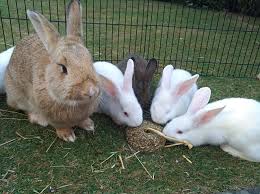

Enteritis, or digestive tract inflammation, is one of the most common disease conditions in rabbits. Unfortunately, rabbit enteritis itself is usually a symptom and has many potential causes. There are several diseases that result in enteritis but, there are also many management mistakes that can result in this potentially deadly condition.
Symptoms of enteritis in rabbits
Rabbit enteritis is characterized by watery diarrhea, but this symptom is usually preceded by symptoms that may not be noticed, including decreased feed intake and constipation. This is generally followed by moderate diarrhea and mild dehydration, which do not sound particularly dangerous, but rabbits can die at this stage. Symptoms soon progress to acute diarrhea, complete cessation of food and water intake and often, tooth grinding by the rabbit in response to abdominal pain. The rabbit may even go into a coma. Mortality at this stage is very high.
So how can you help protect your rabbits from this very dangerous disease state? Maintaining good biosecurity and sanitation is obvious, but there are other management tools you can use to reduce the incidence of enteritis.
How to prevent enteritis in rabbits
Fortunately, there are some measures you can utilize to minimize occurrence of digestive disturbance:
- Never switch feeds abruptly. Always gradually mix new feed with old feed, taking at least seven days to transition from the old feed to the new feed. This allows the microflora of the gut to adjust to the new feed.
- Never introduce a new feed, even hay, in large amounts.
- Be sure to feed a quality feed that contains adequate fiber. Fiber is essential for proper gut health.
- Avoid feeding treats and supplements that will dilute the fiber content of the total ration. Especially avoid treats/supplements that may be high in sugars and starches. Just because your rabbit loves it doesn’t mean it’s good for him!
- Do not feed anything, even a high-fiber product, in any measurable amount just once a week “for a reward.” All this does is present the rabbit’s digestive tract with a new feed that it never has a chance to get used to.
- Feed a small handful of grass hay daily to encourage gut health and give the rabbit something to chew on. This long-stem fiber can be especially helpful during unavoidable stress events.
- Enteritis is commonly seen at weaning, so it is important to minimize stress as much as possible for baby rabbits (kits) at this time. Rather than removing the kits from the mother (doe) and the cage they have lived in since birth, remove the doe instead. The kits will still be in their familiar cage, complete with the mother’s comforting smell. While still stressful, this will be considerably less stressful than moving the kits to a completely new cage.
- Make sure your rabbits always have plenty of fresh, clean, cool water to drink.
- Never feed moldy feed, insect-infested feed, or feed that smells odd. Never let feed build up in feeders and get musty or moldy.
- Always inspect feed before storing or feeding it, and keep the bag the feed came in. If there is a problem, the date code on the bag will be very important.
- Monitor feces for indication of parasites. A veterinarian can perform a fecal exam and identify any parasites that may be present and then prescribe appropriate medication.
- Never place newly weaned kits on a new feed, even if you do a slow transition. This is simply not the right time in their life to be risking digestive upset. Start them on the desired feed from birth or wait until they are clearly past the post-weaning stress period to make any feed changes.
- Always properly quarantine rabbits that are new to your rabbitry or have traveled and are returning. You never know what pathogens they might introduce; 30 days of quarantine will ensure that the rest of your rabbits stay healthy.
- Always pay close attention to your rabbits. Noticing decreased feed intake and/or constipation and taking good management action can literally mean the difference between life and death for your rabbit.
- Never administer drugs without the direction of a veterinarian. Some drugs will cause enteritis in rabbits.
- Baby rabbits are very fragile and should not be handled a lot, especially by children, who may not understand how stressful this is for the rabbit.
- Learn how to properly lift and hold rabbits (definitely not by their ears!). Improper handling can cause great stress.
- Establish a good working relationship with a veterinarian before you need it. If your rabbit does get ill, you will have professional help at your fingertips.
Using good judgment, common sense, and observing life from the rabbit’s point of view can help you minimize the stressors in your rabbit’s life.
 Contact Jaguza Support
Contact Jaguza Support